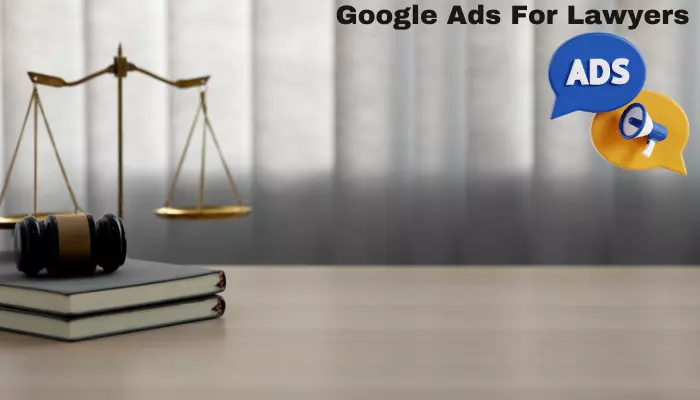Local SEO Services Near Me | Local Pro1 Welcome to...
Maximizing Legal Leads: Google Ads for Lawyers
Maximizing Legal Leads| Google Ads for Lawyers
Google Ads is an online advertising platform developed by Google, which allows businesses and professionals, including lawyers, to promote their services and reach a targeted audience through paid advertising. This advertising system operates on a pay-per-click (PPC) model, where advertisers pay a fee each time a user clicks on their ad. Localpro1 provides the best services of google ads for lawyers.

Do Google Ads Work for Lawyers?
Google Ads can be an effective marketing tool for lawyers when used strategically. Here, we’ll explore its effectiveness and address common challenges and misconceptions associated with it.
Targeted Audience Reach: Google Ads allow lawyers to target specific keywords and demographics. This means your ads can reach people actively searching for legal services in your practice area and geographic location. This focused approach can lead to better-qualified leads.
Measurable Results: Google Ads provide detailed analytics, allowing lawyers to track the performance of their ads. You can measure clicks, conversions, and the return on investment (ROI). This data-driven approach helps in optimizing ad campaigns over time.
Cost-Effectiveness: While the cost of Google Ads can vary, you have control over your budget. You can set a daily or monthly spending limit, ensuring that you don’t overspend. Additionally, the pay-per-click (PPC) model means you only pay when someone clicks on your ad, making it cost-effective.
Common Challenges and Misconceptions:
Competition: The legal industry is highly competitive, so bidding for keywords can be expensive. However, with effective keyword research and ad targeting, you can manage costs and still get results.
Ad Quality: Google rewards well-crafted, relevant ads with higher ad placements and lower costs. Writing compelling ad copy and ensuring your landing pages are relevant can make a significant difference.
Legal Regulations: Some legal practices have strict advertising regulations. Ensure that your ad content complies with ethical and legal standards in your jurisdiction.
Benefits of using Google Ads for lawyers:
Targeted Audience Reach: As mentioned earlier, Google Ads allow you to target specific keywords, geographic areas, and even the time of day when your ads appear. This precision ensures that your ads are seen by the right people who are more likely to convert into clients.
Measurable Results: Google Ads provide extensive data and analytics, giving you insights into the performance of your campaigns. You can track the number of clicks, impressions, conversions, and the cost per click (CPC). This data enables you to adjust your strategies for better results.
Cost-Effectiveness: With a well-optimized campaign, Google Ads can be a cost-effective advertising method. You can set your budget and bid strategy, and you only pay when someone clicks on your ad. This means you have control over your spending and can allocate your budget to the most effective keywords and ads.
Are Lawyers Allowed to Advertise?
Rules and regulations governing lawyer advertising: Lawyers are generally allowed to advertise their services, but these advertisements are subject to specific rules and regulations. These regulations vary by jurisdiction, but some common principles include:
Truthfulness and accuracy: Lawyers must ensure that their advertisements are truthful and accurate, avoiding any false or misleading information.
Avoiding comparisons: Lawyers should avoid making comparisons with other lawyers or implying superiority over competitors.
No guarantees: Lawyers cannot guarantee specific outcomes in their advertising, as it can be seen as unethical and misleading.
Confidentiality: Lawyers must protect client confidentiality in their advertising, and revealing specific client details without consent is usually prohibited.
Common restrictions and guidelines:
State Bar Rules: Lawyers are typically subject to their state’s bar association rules, which regulate lawyer advertising. These rules vary by jurisdiction, so it’s crucial for lawyers to be aware of and comply with their specific state’s regulations.
Clear identification: Lawyers must clearly identify their advertising as such, making it evident that they are promoting their legal services.
Fee disclosures: Some jurisdictions require lawyers to disclose their fee structures and whether they offer free consultations.
Avoiding solicitation: Unsolicited in-person or direct communication with potential clients can be restricted, as it can be perceived as intrusive.
Strategies for compliant lawyer advertising:
Building an ethical online presence:
Maintain a professional website: Create a website that presents your legal services clearly and professionally.
Use social media responsibly: Be mindful of what you post on social media platforms, ensuring that your content aligns with ethical and professional standards.
Include disclaimers: Clearly indicate that your online content is for informational purposes and not legal advice.
Avoiding misleading information:
Be truthful: Ensure that all information in your advertising is accurate, and avoid exaggerations or misleading statements.
Avoid guarantees: Do not promise specific outcomes, as legal cases can be unpredictable, and making guarantees can be seen as unethical.
Client testimonials: If using client testimonials, make sure they are accurate and not misleading.
Maintaining professional standards:
Stay informed: Keep up to date with the latest rules and regulations governing lawyer advertising in your jurisdiction.
Review and update: Regularly review your advertising materials to ensure they comply with current guidelines.
Seek legal counsel: If you are uncertain about the compliance of your advertising, it’s wise to consult with another attorney or your state bar association.
Understand the Costs of Google Ads
Budget Allocation: When running Google Ads campaigns for a law firm, it’s essential to allocate your budget effectively. Consider the following expenses:
Campaign Budget: Decide how much you’re willing to spend on each campaign. For instance, you may have separate campaigns for different practice areas, such as personal injury, family law, or criminal defense.
Ad Group Budget: Within each campaign, allocate a budget to individual ad groups. Ad groups are usually focused on specific keywords or themes related to your legal services.
Daily Budget: Set daily budgets to control how much you spend per day on each campaign or ad group. This helps you stay within your overall budget and prevents overspending.
Geographic Targeting: Allocate your budget based on geographic locations where you want to target potential clients. You might prioritize spending in areas where your legal services are most in demand.
Bidding Strategies: Your bidding strategy can significantly impact your Google Ads costs. Consider the following aspects:
Manual Bidding vs. Automated Bidding: Decide whether you want to manually set your bids or use Google’s automated bidding strategies. Manual bidding gives you more control, while automated bidding can save time but requires careful monitoring.
Keyword Bids: Adjust your keyword bids based on their performance. High-converting keywords may warrant higher bids, while low-performing ones should have lower bids to control costs.
Quality Score: Improve your ad’s Quality Score by creating relevant ad copy and landing pages. A higher Quality Score can lead to lower costs per click (CPC).
Tips for managing and optimizing Google Ads budget:
Cost per Click (CPC) and Ad Spend Control: To manage your budget effectively and control costs:
Monitor and Adjust Bids: Regularly review your keyword bids and adjust them to achieve a balance between visibility and cost. Lower bids on underperforming keywords and increase bids on those that bring in quality leads.
Negative Keywords: Use negative keywords to prevent your ads from showing for irrelevant search terms. This can reduce unnecessary clicks and lower your ad spend.
Ad Schedule: Analyze the performance data and adjust your ad schedule. Focus your budget on the times when potential clients are more likely to search for legal services.
Maximizing ROI through Effective Budget Management: To ensure you get the most out of your Google Ads budget:
Conversion Tracking: Implement conversion tracking to measure the success of your campaigns. Knowing which keywords and ads generate leads and clients will help you allocate your budget more effectively.
A/B Testing: Continuously test different ad copy, landing pages, and call-to-action elements to optimize your conversion rates. This can help improve your ROI.
Regular Optimization: Allocate time to review your campaign performance data and make necessary adjustments. Identify and eliminate underperforming ads, keywords, or campaigns to allocate your budget more efficiently.
Landing Page Optimization: Ensure that your landing pages are user-friendly and persuasive. A well-optimized landing page can improve conversion rates and maximize your budget’s effectiveness.
Best Practices for Lawyers Using Google Ads
Creating compelling ad copy and landing pages:
Craft clear and concise ad copy: Write ad headlines and descriptions that accurately reflect your legal services and entice potential clients to click.
Use relevant keywords: Include keywords in your ad copy to improve ad relevance and quality score.
Highlight unique selling points: Emphasize what sets your legal practice apart from competitors.
Create mobile-friendly landing pages: Ensure your landing pages are responsive and load quickly on mobile devices.
Leveraging keyword research for legal services:
Conduct thorough keyword research: Identify keywords relevant to your legal practice and services.
Utilize long-tail keywords: Target specific, less competitive keywords to reach a more targeted audience.
Negative keywords: Exclude irrelevant or non-converting keywords to avoid wasting ad spend.
Targeting the right audience:
Define your target audience: Clearly identify the demographics, location, and other characteristics of your ideal clients.
Use audience targeting options: Leverage Google Ads’ audience targeting features, such as demographic targeting and affinity audiences.
Geo-targeting: Focus your ads on specific geographic areas where your potential clients are located.
Retargeting: Use retargeting campaigns to reach users who have previously visited your website.
Monitoring and optimizing ad campaigns:
Regularly review campaign performance: Keep an eye on click-through rates (CTR), conversion rates, and cost per conversion.
A/B testing: Experiment with different ad variations to identify the most effective ones.
Adjust bid strategies: Optimize your bidding strategy to maximize ROI and budget allocation.
Negative keywords: Continuously refine your list of negative keywords to filter out irrelevant traffic.
Quality score: Improve your ad quality score by ensuring ad relevance and providing a good user experience on your landing pages.
Measuring success with key performance indicators (KPIs):
Set clear objectives: Define your goals, whether it’s increasing website visits, lead generation, or client conversions.
Track KPIs: Monitor metrics like conversion rate, click-through rate, cost per click, and return on ad spend.
Conversion tracking: Implement conversion tracking to measure the impact of your ads on lead generation and client acquisition.
Analyze data: Use Google Ads analytics to gain insights into campaign performance and make data-driven decisions.
ROI analysis: Calculate the return on investment to ensure your ad campaigns are cost-effective.
Conclusion
In conclusion, Google Ads offers a myriad of advantages for lawyers looking to enhance their online presence and grow their client base. First and foremost, it provides a highly targeted advertising platform that allows legal professionals to reach potential clients precisely when they are searching for relevant legal services. Feel free to contact us for any type of query or the services related to google ads for lawyers.
FAQs
What Are Google Ads For Lawyers?
Google Ads for lawyers are online advertising campaigns designed to promote legal services on Google’s search engine and other affiliated platforms. These ads appear when users search for relevant legal keywords, helping law firms reach potential clients.
How Do Google Ads Benefit Law Firms?
Google Ads for lawyers provide a targeted and cost-effective way to reach individuals actively searching for legal services. It allows law firms to increase their online visibility, generate leads, and compete effectively in the digital landscape.
What Types Of Legal Services Can Be Promoted Through Google Ads?
Google Ads can be used to promote a wide range of legal services, including but not limited to personal injury, family law, criminal defence, estate planning, and business law.
How Does The Bidding System Work In Google Ads?
The Google Ads bidding system is based on a pay-per-click (PPC) model. Law firms set a maximum bid for their chosen keywords, and they are charged only when someone clicks on their ad. The bid, along with the ad’s quality score, determines the ad’s position in search results.
What Is The Quality Score, And Why Is It Important For Google Ads?
The Quality Score is a metric used by Google to measure the relevance and quality of an ad. It considers factors such as ad relevance, click-through rate, and landing page experience. A higher Quality Score can lead to lower costs and better ad placements.
Our Services
Our Latest Posts
PPC White Label Services by Local Pro1 | Expert Solutions
PPC White Label Services by Local Pro1 | Expert Solutions...



